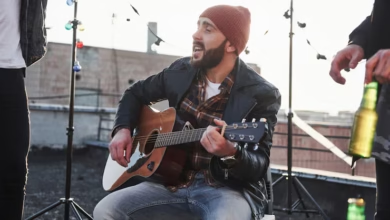Opiniones de canna coffee ice cream cafe burger dispensary

Exploring Opinions on Canna Coffee Ice Cream Cafe Burger Dispensary: A Unique Washington, D.C. Experiment
Canna Coffee Ice Cream Cafe Burger Dispensary, located at 1810 Florida Ave NW in Washington, D.C.’s vibrant Adams Morgan neighborhood, is a business that defies easy categorization. With a name that strings together an eclectic mix of offerings—coffee, ice cream, cafe fare, burgers, and a dispensary component—it’s a place that has sparked curiosity, praise, criticism, and controversy since its inception. As of March 28, 2025, the establishment has undergone significant changes, including a shutdown by D.C. authorities and a pivot to a food truck operation. This article delves into the diverse opinions surrounding Canna Coffee, drawing from customer reviews, media coverage, and community reactions to paint a comprehensive picture of its reputation and impact.
The Concept: A Bold Fusion of Ideas
Canna Coffee Ice Cream Cafe Burger Dispensary first emerged as an ambitious hybrid, blending a coffee shop, ice cream parlor, burger joint, and cannabis-related services under one roof. Originally tied to a cannabis dispensary called Mary Jays Exotic, the business transitioned into a food-focused venue with an unconventional twist. Its website touts a “farm-to-table” coffee experience, 24-hour operation, and a social atmosphere featuring poetry readings, jam sessions, and mocktails. The inclusion of “dispensary” in its branding hints at a hemp or cannabis connection, though legal restrictions in D.C. limit what can be sold outright.
Opinions on this concept vary widely. Some see it as a stroke of genius—an all-in-one destination catering to diverse cravings and lifestyles. “I love the idea of getting a coffee, a burger, and maybe something extra in one stop,” one Reddit user commented in a thread discussing the business. The convenience factor resonates with busy urbanites who value efficiency. Others, however, find the mashup confusing or gimmicky. A Yelp reviewer remarked, “It’s trying to be everything at once, but it doesn’t excel at anything.” This tension between innovation and coherence lies at the heart of public perception.
The Customer Experience: Highs and Lows
Customer feedback offers a mixed bag of insights into Canna Coffee’s day-to-day operations. On the positive side, many praise the welcoming ambiance. Descriptions of a “relaxed atmosphere” and “cafe-like setting” suggest it succeeded in creating a comfortable space for patrons to linger. The staff, particularly in the dispensary aspect, often receive accolades for being knowledgeable and helpful, according to reviews aggregated on sites like Bistrolevalois.ca. For those intrigued by the hemp or cannabis angle, this expertise added value to the experience.
The food and drink offerings elicit more varied responses. Some customers rave about the creativity—croissants, Cinnabon-inspired breakfast items, and an array of ice cream flavors hint at a playful menu. A DoorDash listing for “Canna Coffee Ice Cream Cafe Fish Burger Joint” suggests an expansive selection, from burgers to fish tacos. However, quality and consistency seem to falter. “The coffee was decent, but the burger was overpriced for what you get,” one reviewer noted. High prices are a recurring complaint, with some feeling the portions don’t justify the cost. Long wait times and limited seating during peak hours further dampen enthusiasm, as patrons report frustration with queues and a lack of space to enjoy their purchases.
Sanitation concerns also surface in reviews. A Yelp user claimed to have seen the owner “scratching his butt and then touching cookies with the same hand,” a vivid anecdote that raises eyebrows about hygiene standards. Such reports, while anecdotal, contribute to a perception of unprofessionalism that clashes with the business’s lofty branding.
The Controversy: Greg Harris and the Viral Incident
No discussion of Canna Coffee is complete without addressing the elephant in the room: the September 2024 incident that thrust the business into the national spotlight. Owner Greg Harris was recorded berating an Uber Eats driver, Gregorio Amundarain, in a xenophobic tirade, yelling, “Learn English!” and asserting, “This ain’t your f—ing country.” The video, which amassed over 18 million views on TikTok, sparked outrage and led to swift repercussions. D.C. authorities shut down the establishment days later, citing prior health code violations, while Uber Eats and DoorDash dropped Canna Coffee from their platforms, condemning Harris’s behavior as “disgusting” and discriminatory.
Public opinion on this episode is overwhelmingly negative. Reddit threads on r/washingtondc and r/washdc erupted with condemnation, with users calling Harris’s actions “unhinged” and “racist.” The delivery driver’s account of feeling “humiliated” and “awful” resonated with many, amplifying calls for accountability. Some expressed concern for Harris’s dog, citing reviews alleging animal abuse, further tarnishing his reputation. Yet, a small contingent of supporters emerged, framing the outburst as a one-off or defending his right to free speech—a stance that drew sharp rebuttals from the broader community.
Harris’s response only fueled the fire. Rather than apologizing, he doubled down, posting videos gloating about the attention and portraying himself as a victim of “hate.” This defiance alienated even those who might have given him the benefit of the doubt, cementing Canna Coffee’s status as a pariah in some circles.
The Shutdown and Rebirth: A Food Truck Pivot
By late September 2024, Canna Coffee was ordered to cease operations, a decision rooted in months-long investigations by D.C.’s health and licensing agencies. Notices of infraction from May and August, coupled with a health department closure order on September 11, predated the viral video, suggesting deeper operational issues. The exact violations remain undisclosed, but speculation ranges from sanitation lapses to unlicensed cannabis sales tied to its Mary Jays Exotic origins.
Two months later, in November 2024, Harris resurfaced with a food truck underಸ, signaling a new chapter for Canna Coffee. Instagram posts touting the truck suggest an attempt to salvage the brand, but opinions remain skeptical. Some see it as a resilient move—“He’s not letting the hate stop the grind,” one supporter wrote—while others view it as a desperate bid to stay relevant amid a tarnished reputation.
The Bigger Picture: What Canna Coffee Represents
Canna Coffee Ice Cream Cafe Burger Dispensary embodies the risks and rewards of bold entrepreneurship. Its fusion of coffee, food, and cannabis culture tapped into D.C.’s evolving identity as a hub for innovation, yet its execution stumbled under scrutiny. Opinions reflect this duality: admiration for its ambition, frustration with its flaws, and outrage at its missteps. As of March 28, 2025, its legacy is a cautionary tale of ambition outpacing infrastructure—and a reminder that in a connected world, reputation can shift overnight.
Conclusion: A Tale of Ambition, Controversy, and Resilience
Canna Coffee Ice Cream Cafe Burger Dispensary, as of March 28, 2025, stands as a complex chapter in Washington, D.C.’s evolving cultural and commercial landscape. What began as an audacious experiment—melding coffee, ice cream, burgers, and a nod to cannabis culture—morphed into a polarizing saga defined by innovation, missteps, and a dramatic fall from grace. Opinions about the establishment reflect this rollercoaster: admiration for its bold vision, frustration with its inconsistent execution, and outrage over the behavior of its owner, Greg Harris. Its journey from a brick-and-mortar hotspot in Adams Morgan to a shuttered business reborn as a food truck encapsulates both the promise and peril of pushing boundaries in a tightly regulated city.
For some, Canna Coffee remains a symbol of entrepreneurial daring—a place that dared to defy convention and cater to a niche audience hungry for something different. Its defenders argue that its closure was an overreach, a casualty of bureaucratic scrutiny and public backlash amplified by a single viral moment. Yet, for many more, it’s a cautionary tale of hubris and poor judgment, where ambition outstripped the ability to deliver a consistent, ethical experience. The September 2024 incident with Harris and the Uber Eats driver didn’t just tarnish the brand—it exposed fault lines in its foundation, from sanitation lapses to community disconnect.



